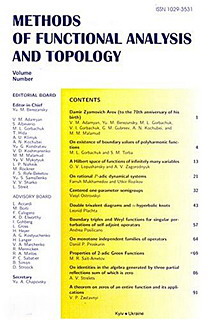Vol. 17 (2011), no. 1
Existence and uniqueness of mild solutions of second order semilinear differential equations in Banach space
MFAT 17 (2011), no. 1, 1-9
1-9
We consider the Cauchy problem for second order semilinear differential equations in Banach space. Sufficient conditions of local and global existence and uniqueness of mild solutions are presented.
G-Frames and operator valued-frames in Hilbert C*-modules
Sedighe Hosseini, Amir Khosravi
MFAT 17 (2011), no. 1, 10-19
10-19
g-frames and fusion frames in Hilbert C*-modules have been defined by the second author and B.~Khosravi in [15] and operator-valued frames in Hilbert C*-modules have been defined by Kaftal et al in [11]. We show that every operator-valued frame is a g-frame, we also show that in Hilbert C*-modules tensor product of orthonormal basis is an orthonormal basis and tensor product of g-frames is a g-frame, we get some relations between their g-frame operators, and we study tensor product of operator-valued frames in Hilbert C*-modules.
The infinite direct products of probability measures and structural similarity
MFAT 17 (2011), no. 1, 20-28
20-28
We show that any similar structure measure on the segment $[0,1]$ is an image-measure of the appropriate constructed infinite direct product of discrete probability measures.
A note on equilibrium Glauber and Kawasaki dynamics for permanental point processes
MFAT 17 (2011), no. 1, 29-46
29-46
We construct two types of equilibrium dynamics of an infinite particle system in a locally compact metric space $X$ for which a permanental point process is a symmetrizing, and hence invariant measure. The Glauber dynamics is a birth-and-death process in $X$, while in the Kawasaki dynamics interacting particles randomly hop over $X$. In the case $X=\mathbb R^d$, we consider a diffusion approximation for the Kawasaki dynamics at the level of Dirichlet forms. This leads us to an equilibrium dynamics of interacting Brownian particles for which a permanental point process is a symmetrizing measure.
The Faddeev equation and essential spectrum of a Hamiltonian in Fock space
Mukhiddin I. Muminov, Tulkin H. Rasulov
MFAT 17 (2011), no. 1, 47-57
47-57
A Hamiltonian (model operator) $H$ associated to a quantum system describing three particles in interaction, without conservation of the number of particles, is considered. The Faddeev type system of equations for eigenvectors of $H$ is constructed. The essential spectrum of $H$ is described by the spectrum of the channel operator.
On generalization of the Freudenthal's theorem for compact irreducible standard polyhedric representation for superparacompact complete metrizable spaces
MFAT 17 (2011), no. 1, 58-64
58-64
In this paper for superparacompact complete metrizable spaces, the Freudenthal's theorem for compact irreducible standard polyhedral representation is ge e alized. Furthermore, for superparacompact metric spaces the following is strengthened: 1) the Morita's theorem about universality of the product $Q^\infty\times B(\tau)$ of Hilbert cube $Q^\infty$ to generalized Baire space $B(\tau)$ of the weight $\tau$ in the space of all strongly metrizable spaces of weight $\le \tau$; 2) Nagata's theorem about universality of the product $\Phi^n\times B(\tau)$ of the universal $n$-dimensional compact $\Phi^n$ to $B(\tau)$ in the space of all strongly metrizable spaces $\le\tau$ and dimension $\operatorname{dim}X\le n.$
Some class of real sequences having indefinite Hankel forms
Luis J. Navarro, Vladimir Strauss
MFAT 17 (2011), no. 1, 65-74
65-74
In this paper we generalize the results given in [14] about real sequences which are not necessarily positive (i.e, they are not sequences of power moments) but can be mapped, by a difference operator, into a power moment sequence. We prove by elementary methods that the integro-polynomial representation of such sequences remains after dropping the condition on its growth imposed in the mentioned article. Some additional results on the uniqueness of the representation are included.
Polarization formula for $(p,q)$-polynomials on a complex normed space
T. V. Vasylyshyn, A. V. Zagorodnyuk
MFAT 17 (2011), no. 1, 75-83
75-83
The aim of this paper to give some analogues of polarization formulas and the polarization inequality for $(p,q)$-polynomials between complex normed spaces. Obtained results are useful for investigation of real-differentiable mappings on complex spaces.
On equiangular configurations of subspaces of a Hilbert space
Yu. S. Samoilenko, Yulia Yu. Yershova
MFAT 17 (2011), no. 1, 84-96
84-96
In this paper, we find $\tau$, $0<\tau<1$, such that there exists an equiangular $(\Gamma, \tau)$-configuration of one-dimensional subspaces, and describe $(\Gamma, \tau)$-configurations that correspond to unicyclic graphs and to some graphs that have cyclomatic number satisfying $\nu(\Gamma) \geq 2$.


